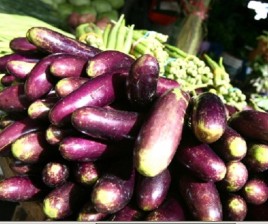Eating, planting vegetables secret to long life, says DOH
Want to live longer? Plant vegetables.
To mark Nutrition Month this July, the Department of Health is urging all Filipino households and communities to plant vegetable gardens in their backyards and other open spaces not only to curb malnutrition among children but to stop the high incidence of noncommunicable diseases in the country.
The DOH cited food consumption surveys by the Food and Nutrition Research Institute (FNRI) that showed Filipinos were eating only two servings of vegetables, or about 110 grams, a day from the 145-gram daily intake recorded in 1978.
It also highlighted FNRI data that showed only 67.7 percent of Filipino households had vegetable gardens or fruit trees in their backyards.
“The data is alarming considering that low fruit and vegetable intake is among the top 10 risk factors for global mortality based on a World Health Organization report,” said the DOH.
Article continues after this advertisementThe WHO report attributed 1.7 million deaths globally per year to low fruit and vegetable intake.
Article continues after this advertisementAccording to health experts, one serving should be equivalent to a cup of raw leafy vegetables or half a cup of raw or cooked non-leafy vegetables.
Assistant Secretary Maria Bernardita Flores, executive director of the DOH’s National Nutrition Council (NNC), urged Filipinos to plant vegetables “in all possible places.”
She said vegetables can grow even in urban areas using the latest technologies like container gardening or hydroponics, where plants are grown in water.
Most common NCDs
Underscoring the importance of vegetables in one’s daily diet, the DOH said Filipinos, especially children, should eat more of the green leafy stuff as they contain vitamins and minerals that help combat noncommunicable diseases (NCDs) such as cancer, heart disease and diabetes.
NCDs or lifestyle-related diseases are the top leading causes of death in the Philippines. These diseases are linked to four “most common but preventable” risk factors: An unhealthy diet, lack of physical activity, smoking and alcohol use.
To promote vegetable consumption among students, the DOH has partnered with the Department of Education which recently issued a memorandum urging public schools to plant vegetable gardens in celebration of Nutrition Month.
Flores said vegetables were good sources of Vitamin A and iron nutrients important to boosting a child’s immune system and development.
Infants 6 months old and above should be served pureed, mashed or finely cut green leafy and yellow vegetables mixed with rice porridge (lugaw) to complement breast milk, she said.
Ideal daily intake
Flores said the NNC was concerned about data showing that infants 6-11 months old were fed only two grams of vegetables a day while 1-year-olds were given eight grams.
Oncologists or cancer doctors have said the ideal daily intake of vegetables and fruits is at least five servings, where a serving is as big as a fist.
“We encourage everyone to consume three or more servings of vegetables each day. Let us also eat our indigenous vegetables such as malunggay, saluyot, kangkong, kamote tops and ampalaya,” said Flores.
